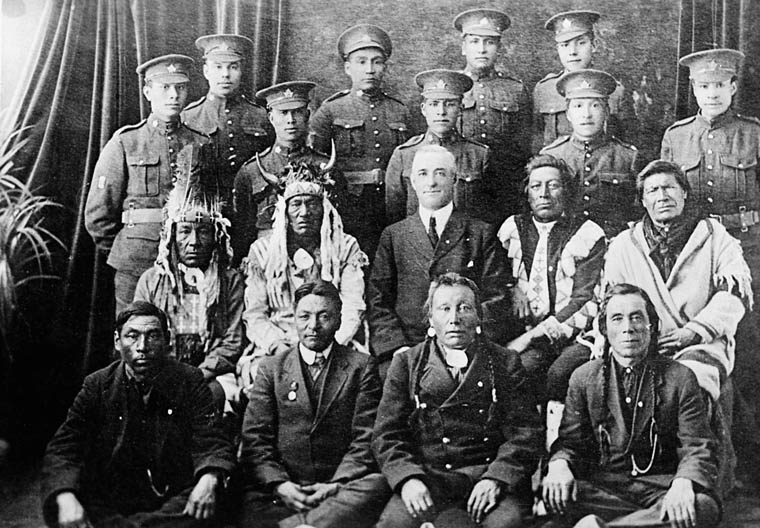SOCI221 – Sociology of Cyberspace
Meeting 8: November 3, 2014
Identity to Generations
Generations

First Nations CEF soldiers: By Canada. Dept. of the Interior. (Public domain)
Last Week
Social Identity
Activity: Online Reputation
- Expectations
- Factors in ease of finding
- Public/private
Required Texts
- Halford, Susan, and Mike Savage. “Reconceptualizing Digital Social Inequality.” Information, Communication & Society 13, no. 7 (2010): 937–955. doi:10.1080/1369118X.2010.499956.
- Berman, Joshua, and Amy S. Bruckman. “The Turing Game: Exploring Identity in an Online Environment.” Convergence: The International Journal of Research into New Media Technologies 7, no. 3 (September 01, 2001): 83–102. doi:10.1177/135485650100700307.
Halford & Savage
Halford, Susan, and Mike Savage. “Reconceptualizing Digital Social Inequality.” Information, Communication & Society 13, no. 7 (2010): 937–955. doi:10.1080/1369118X.2010.499956.
- Inequalities vs. divides
- Links to other texts
Berman & Bruckman
Berman, Joshua, and Amy S. Bruckman. “The Turing Game: Exploring Identity in an Online Environment.” Convergence: The International Journal of Research into New Media Technologies 7, no. 3 (September 01, 2001): 83–102. doi:10.1177/135485650100700307.
- Playing with identity
- How is identity constructed?
Next Week
Generations
Activity: Knapsacks
- Go through one of the following checklists.
- Unpacking the invisible knapsack (first part): http://lar.me/2-z
- Able-bodied privilege (pp. 5–8): http://lar.me/300
- Daily effects of straight privilege: http://lar.me/301
- Invisible Knapsack worksheet: http://lar.me/304
- Gallavan version: http://lar.me/305
- For your own benefit, document the process. Any discomfort? Any realization?
- Based on the exercise, post something more general about privilege. In other words, no need to share about your own privilege, but go from that experience to something broader.
- Feel free to add something about online interactions, but that may not be necessary.
Required Texts
- Prensky, M. “Digital Natives, Digital Immigrants Part 1.” On the Horizon 9, no. 5 (2001): 1–6.
- Bennett, Sue, Karl Maton, and Lisa Kervin. “The ‘digital Natives’ Debate: A Critical Review of the Evidence.” British Journal of Educational Technology 39, no. 5 (September 2008): 775–786. doi:10.1111/j.1467–8535.2007.00793.x.
- Selwyn, Neil. “The Digital Native – Myth and Reality.” Aslib Proceedings 61, no. 4 (2009): 364–379. doi:10.1108/00012530910973776.
Alternative
- White, David S. and Alison Le Cornu “Visitors and Residents: A new typology for online engagement” First Monday, Volume 16, Number 9 – 5 September 2011
Digital Natives?
- Deconstructing Prensky’s argument
- Confirmation bias
- Concept’s usefulness
- Essentialism and reification
- Video version https://www.youtube.com/watch?v=9WVKBAqjHiE
Online Traces
If you are not paying for it, you’re not the customer; you’re the product being sold.” – blue_beetle http://lar.me/2zh
“I’m Not The Product, But I Play One On The Internet.” –Derek Powazek http://lar.me/2zi
- Content
- Votes, likes
- Playlistism http://lar.me/2zf
- Search History
- The dark side of data http://lar.me/2zg
- Using Metadata to find Paul Revere – Kieran Healy http://lar.me/2zd
